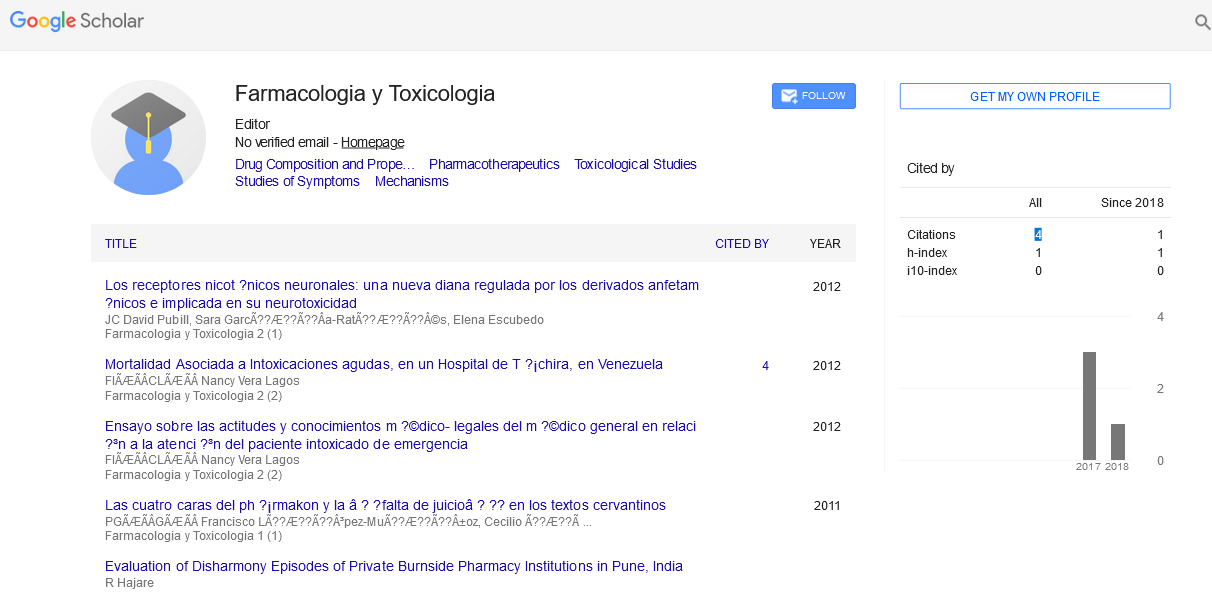Perspective - (2024) Volume 14, Issue 4
Clinical Trials in Toxicology: Safeguarding Health through Rigorous Research
Geny Piro*
Department of Toxicology, University of Benaga, Cyberjaya, Malaysia
*Correspondence:
Geny Piro, Department of Toxicology, University of Benaga, Cyberjaya,
Malaysia,
Email:
Received: 02-Jul-2024, Manuscript No. IPFT-24-14974;
Editor assigned: 05-Jul-2024, Pre QC No. IPFT-24-14974 (PQ);
Reviewed: 19-Jul-2024, QC No. IPFT-24-14974;
Revised: 01-Aug-2024, Manuscript No. IPFT-24-14974 (R);
Published:
29-Aug-2024
Introduction
Clinical trials in toxicology play a crucial role in ensuring the
safety and efficacy of pharmaceuticals, chemicals and other
substances before they reach the market. These trials are
meticulously designed and conducted to assess potential risks
and benefits, providing essential data that informs regulatory
decisions and protects public health. This article explores the
significance, process, challenges and ethical considerations of
clinical trials in toxicology.
Description
Significance of clinical trials in toxicology
Toxicology is the study of adverse effects of chemicals or
substances on living organisms, crucial in assessing their safety
for human use. Clinical trials within this field aim to evaluate the
toxicological profile of substances, including pharmaceutical
drugs, pesticides and industrial chemicals, among others. The
primary goal is to determine potential adverse effects on
humans and establish safe exposure levels.
Clinical trials in toxicology are pivotal in several ways
Safety evaluation: They provide critical data on the safety
profile of substances, identifying potential risks and adverse
effects that may occur at various exposure levels.
Regulatory requirements: Regulatory bodies, such as the FDA
in the United States or the EMA in Europe, require
comprehensive toxicological data from clinical trials to approve
new drugs and substances for public use.
Public health protection: By rigorously assessing potential
risks, clinical trials ensure that only safe substances enter the
market, thus safeguarding public health.
The Process of clinical trials in toxicology
Clinical trials in toxicology typically follow a structured process
to gather comprehensive data while adhering to ethical
standards and regulatory requirements:
Preclinical studies: Before human trials, substances undergo
extensive testing in laboratory settings (in vitro and in vivo) to
understand their pharmacokinetics, toxicokinetics and potential
toxicity.
Phase I trials: These initial trials involve a small group of
healthy volunteers to assess the safety profile, pharmacokinetics
and pharmacodynamics of the substance. The focus is on
determining safe dosage ranges and identifying potential
adverse effects.
Phase II trials: Conducted on a larger group of participants
(patients), these trials evaluate the substance's efficacy in
treating the targeted condition while continuing to monitor
safety.
Phase III trials: These trials involve a larger and more diverse
patient population to further evaluate efficacy, monitor adverse
effects comprehensively and gather additional data on safety
and dosage.
Post-marketing surveillance: Even after approval, ongoing
monitoring (phase IV) helps detect rare adverse effects or
interactions that may not have been evident in earlier trials.
Challenges in clinical trials in toxicology
While essential, clinical trials in toxicology face several
challenges:
Ethical considerations: Ensuring trials uphold participant
rights and safety while balancing the need for rigorous scientific
data.
Complexity of toxicological effects: Some adverse effects may
not manifest immediately or may be dose-dependent, requiring
long-term monitoring and comprehensive data analysis.
Regulatory hurdles: Meeting stringent regulatory
requirements and adapting to evolving guidelines can be timeconsuming
and costly for researchers and pharmaceutical
companies.
Participant recruitment: Finding suitable participants who
meet specific criteria and are willing to participate in trials can
be challenging, particularly for rare diseases or specific
demographics.
Ethical considerations in clinical trials
Ethical principles guide the design and conduct of clinical
trials in toxicology:
Informed consent: Participants must fully understand the
risks and benefits of participation, ensuring voluntary and
informed decision-making.
Beneficence and non-maleficence: Trials must prioritize
participant welfare, minimizing harm and maximizing potential
benefits.
Transparency: Clear communication of trial objectives,
procedures and potential risks to participants and the broader
public.
Respect for participants: Upholding dignity, privacy and
confidentiality of participants throughout the trial process.
Regulatory considerations and ethical standards
Regulatory agencies, such as the Food and Drug
Administration (FDA) in the United States and the European
Medicines Agency (EMA) in Europe, play pivotal roles in
overseeing clinical trials and ensuring that rigorous toxicological
assessments are conducted. These agencies establish guidelines
for study design, data collection and reporting standards to
safeguard patient welfare and public health.
Ethical considerations are paramount in clinical trials,
particularly in toxicology, where potential risks to participants must be carefully balanced against the benefits of advancing
medical knowledge. Informed consent, ethical review boards and
adherence to Good Clinical Practice (GCP) guidelines are
fundamental in ensuring that trials are conducted ethically and
transparently.
Conclusion
Clinical trials in toxicology are indispensable in evaluating the
safety and efficacy of substances before they are introduced to
the public. They provide crucial data that informs regulatory
decisions, protects public health and advances scientific
knowledge. Despite challenges, ethical considerations and
rigorous methodologies ensure that clinical trials uphold the
highest standards of safety and integrity, benefiting both present
and future generations. As research and technology continue to
evolve, so too will the methodologies and ethical frameworks
that underpin clinical trials in toxicology, ensuring safer and
more effective treatments for all.
Citation: Piro G (2024) Clinical Trials in Toxicology: Safeguarding Health through Rigorous Research. Farmacologia Toxicologia, Vol.14 No.4: 037





